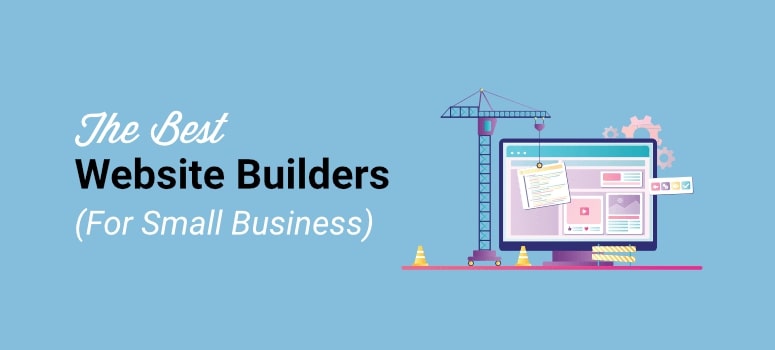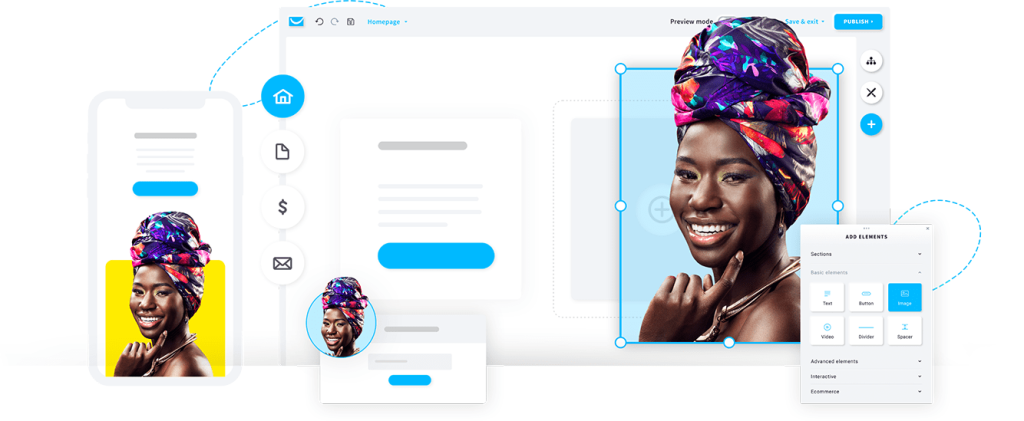Looking for the right website builder for your small business? Compare top platforms to find the perfect fit based on features, ease of use, and affordability.
A website is more than just a digital address. For small businesses, it serves as a vital connection to customers. But with so many website builders available, finding the right one can be challenging. Each builder offers unique features and functionalities.
Some focus on ease of use, while others emphasize customization. Understanding your business needs is key to making the best choice. You must consider factors like budget, design options, and support. This guide will help you navigate these choices, ensuring you select a builder that aligns with your business goals. Let’s explore how to pick the ideal platform for your business.

Identify Your Business Needs
Choosing the right website builder for your small business begins with understanding your unique needs. Every business is different, and knowing what you need can save you time and money. When you identify your business needs, you lay the foundation for a successful online presence.
Assess Required Features
Start by listing the features you need for your website. Do you need an online store or booking system? Consider if you need SEO tools to rank higher in search results. If you’re planning to blog, a user-friendly CMS is essential. Make sure the website builder can accommodate these features without hassle. When I started my own business, I realized too late that my chosen builder lacked a crucial feature for customer reviews. A little research upfront could have saved me from switching later. What must-have features can’t you live without?
Consider Business Goals

Your website should align with your business goals. Are you aiming to generate more leads or to build an online portfolio? If your goal is to expand your online store, ensure the website builder supports e-commerce features. Think about scalability; if your business grows, your website should grow with it. When I envisioned growing my business internationally, I needed a builder that supported multiple languages. Planning for growth can prevent future headaches. What are your long-term goals for your website?
Understand Your Budget
Determining your budget is crucial for selecting a website builder. Consider costs for features, hosting, and maintenance. Find a balance between affordability and the essential tools you need for your small business.
Choosing the right website builder for your small business involves more than just selecting a platform that looks good. One of the most critical steps is understanding your budget. Your financial resources will guide your decision and help ensure you get the best value for your money. It’s not just about finding the cheapest option but about balancing cost with the features your business truly needs.
Evaluate Cost Vs Value
Start by listing the features you need from a website builder. Do you need e-commerce capabilities, or is a simple blog enough? Some builders offer advanced features like SEO tools and marketing integrations. Consider whether these extras justify a higher cost. Sometimes, investing a little more upfront can save money in the long run by reducing the need for third-party services.
Think about how much time you’re willing to invest in building and maintaining your site. A more expensive builder might offer better support and ease of use, saving you time and stress. On the flip side, if you’re tech-savvy and enjoy DIY projects, a cheaper option with fewer built-in features might suit your needs perfectly.
Plan For Future Expenses

What are your business goals over the next couple of years? If you plan to expand, consider how your website needs might change. Will you need more bandwidth or advanced e-commerce features? Some builders charge extra for these expansions, so it’s crucial to factor this into your budget.
Subscription fees can vary significantly. While a basic plan might fit your current budget, scaling up can be costly. Look for builders that offer flexible pricing plans that grow with your business. This foresight can prevent financial surprises and ensure your website can evolve with your business needs.
Understanding your budget is not a one-time task. It’s an ongoing process that requires regular reviews. Are you getting the value you expected from your current website builder? Periodically reassess to ensure your investment aligns with your business goals. How do you ensure your website builder choice remains a valuable asset to your business journey?
Explore Design Options
Choosing the right website builder involves exploring various design options. Design plays a crucial role in attracting and retaining customers. A well-designed website showcases your business’s professionalism and brand identity. It’s essential to consider how design options can impact user experience and engagement.
Template Versus Custom Design

Website builders often offer two primary design options: templates and custom design. Templates provide a quick and easy solution. Pre-made layouts are available that are easy to customize. They cater to different industries, ensuring a professional look. Templates save time and are budget-friendly.
Custom design offers more flexibility. It allows for unique branding and specific feature inclusion. Custom design requires more effort and investment but ensures a distinct website. This option is best for businesses with specific design needs.
Importance Of Responsive Design
Responsive design is critical in today’s mobile-driven world. It ensures your website looks good on all devices. A responsive website adapts to different screen sizes seamlessly. This feature enhances user experience and reduces bounce rates. A site that’s easy to navigate keeps visitors engaged longer.
Search engines favor responsive websites. They rank higher in search results. A responsive design improves your site’s visibility. It also boosts your potential customer reach. Prioritize responsive design for a successful online presence.
Evaluate User Experience
Choosing a website builder for your small business is crucial. Evaluate user experience thoroughly to ensure smooth operation. A positive user experience leads to more engagement and potential sales. Understanding key aspects can make all the difference.
Ease Of Use
Ease of use is vital. A user-friendly interface saves time and effort. Look for drag-and-drop features. They simplify the design process. Intuitive dashboards help manage content efficiently. You shouldn’t need expert skills to operate. Test the builder’s demo if available. Ensure it feels comfortable and straightforward.
Customer Support Availability
Reliable customer support is essential. You may encounter challenges. Quick support can resolve issues swiftly. Check the availability of support channels. Live chat and phone support are ideal. Look for tutorials and FAQs. They offer self-help options. Support should be accessible during business hours. Ensure they provide prompt and helpful responses.
Analyze Seo Capabilities
Choosing the right website builder is crucial for your small business. SEO capabilities play a key role in this decision. They help your website rank higher in search results. This means more visibility and potential customers. Understanding SEO features can guide you in selecting a builder that supports your goals. Let’s dive into some essential aspects of SEO features.
Built-in Seo Tools
Look for website builders with built-in SEO tools. These tools simplify optimizing your site. They provide features like meta tags and keyword suggestions. Meta tags help search engines understand your content. Keyword suggestions guide you in choosing the right words. These tools reduce the need for external plugins. They streamline your SEO process.
Seo Best Practices
Understand the SEO best practices offered by the builder. Check if it supports responsive design. Responsive design improves mobile search ranking. Ensure it allows easy URL customization. Custom URLs help in better indexing by search engines. Verify if it provides analytics integration. Analytics can track your site’s performance and traffic. These practices are essential for effective SEO.

Credit: mrbusinessmagazine.com
Review Integration Possibilities
Exploring integration options can help you choose the right website builder for your small business. Look for builders that easily connect with popular tools and services. Seamless integration enhances functionality and streamlines operations.
Choosing the right website builder for your small business can be daunting. One key factor to consider is integration possibilities. Integrations enhance your website’s functionality and user experience. They connect your site with other platforms, making operations smoother. Here, we explore two critical integration types: social media and e-commerce.
Social Media Integration
Social media integration is essential for modern businesses. It connects your website with social platforms like Facebook, Instagram, and Twitter. This integration allows visitors to share content directly from your site. It helps increase your brand’s visibility. Social media buttons should be easy to locate. Choose a website builder that offers smooth social media integration. This ensures your audience stays engaged with your brand.
E-commerce Functionality
E-commerce functionality is vital if you sell products or services online. It enables you to manage transactions, inventory, and customer data. Look for builders offering secure payment gateways like PayPal or Stripe. Ensure the builder supports product catalogs and shipping options. Inventory management and order tracking features are crucial. A robust e-commerce system enhances customer satisfaction. It simplifies their buying process and boosts your sales. Consider these features for a seamless online shopping experience.
Consider Scalability
Choosing the right website builder for your small business means considering scalability. As your business grows, your website needs to grow too. Scalability ensures your website can handle more traffic and features without issues. It’s crucial to choose a builder that adapts to your evolving needs. Explore the growth potential and feature expansion to make an informed choice.
Growth Potential
Your business may start small, but it won’t stay that way. The website builder must support your growth. Look for builders offering flexible plans. These plans should allow for more pages and products. Check for bandwidth and storage capacity. These elements ensure your website stays fast and responsive. A slow website can drive visitors away.
Consider builders with cloud hosting options. Cloud hosting scales with your needs. It prevents downtime during high traffic periods. Also, examine the builder’s user base. Popular builders often have better support and updates. Choose a builder that can grow with you.
Feature Expansion
Think about the features your business might need later. Start with essential features like contact forms and galleries. As you expand, you may need eCommerce capabilities. Look for website builders offering plug-ins or integrations. These add new functions without a complete rebuild.
Check if the builder supports third-party apps. Third-party apps can enhance functionality. They offer options for marketing, social media, and analytics. A builder with a wide range of features saves you time and money. You won’t need a new builder every time your needs change.

Credit: www.top10.com
Read Reviews And Testimonials
Choosing the right website builder is crucial for your business’s success. Reading reviews and testimonials can guide your decision. They offer insights into real user experiences and expert opinions. This can save you time and money. It helps you avoid potential pitfalls. Reviews reveal the pros and cons of each platform. They also highlight the features that matter most to small businesses.
Real User Experiences
User reviews provide genuine feedback. They show what works and what doesn’t. Reading them helps you understand the builder’s strengths and weaknesses. You learn if the platform is user-friendly. Or if the customer support is responsive. Real experiences can also reveal hidden costs. This information is vital for small business owners. It helps you make an informed decision.
Industry Expert Opinions
Expert opinions offer another layer of insight. They analyze the technical aspects of website builders. Experts compare features, pricing, and scalability. Their reviews often include detailed evaluations. This can be helpful if you need a deeper understanding. Industry experts can highlight trends and updates. Their insights help you stay ahead in the digital landscape.

Credit: bsscommerce.com
Frequently Asked Questions
What Website Builder Should I Use For A Small Business?
Consider using Wix, Squarespace, or Shopify for your small business website. These platforms are user-friendly and offer customizable templates. They provide essential features like e-commerce integration, SEO tools, and responsive design. Choose based on your specific needs and budget for the best results.
Which Type Of Website Is Best For Small Business?
A WordPress site is ideal for small businesses. It offers flexibility, ease of use, and SEO-friendly features. With numerous plugins and themes, it supports customization and scalability. A well-designed website enhances online presence, attracts customers, and drives business growth.
How Much Should A Website Cost For A Small Business?
A small business website typically costs between $2,000 and $10,000. Factors include design complexity, functionality, and customization. Monthly maintenance and hosting add extra costs. Budgeting for professional web design ensures quality and effectiveness.
How Much Should I Expect To Pay Someone To Build A Website?
Website costs vary widely based on complexity, design, and features. Basic sites may cost $500-$5,000, while complex ones range from $10,000-$50,000 or more. Freelancer rates can be lower than agencies. Always get multiple quotes to compare.
Conclusion
Choosing the right website builder is crucial for your small business. It helps create a strong online presence. Consider your budget, features, and ease of use. Compare different builders before making a decision. Prioritize those that offer good customer support.
Test a few options with free trials. This helps you find the best fit. Keep your business goals in mind. Make sure the builder supports these goals. A well-chosen builder saves time and effort. It leads to a professional, functional website.
This boosts your business’s credibility and success.




